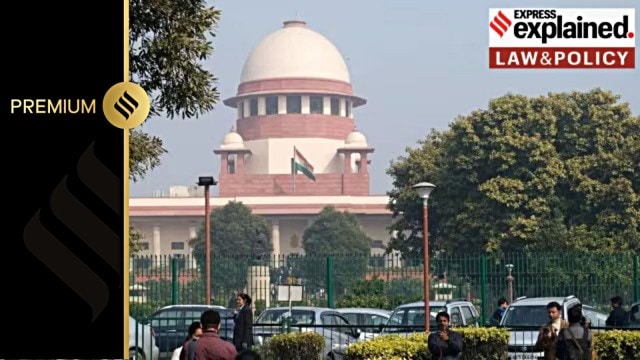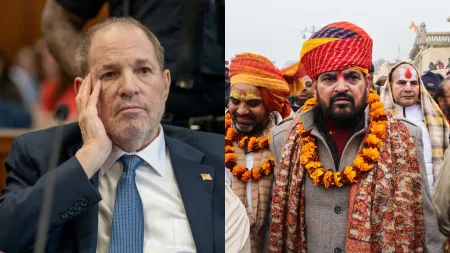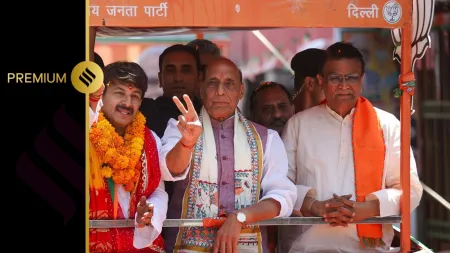- India
- International
How Supreme Court’s verdict on climate change can push climate litigation in India
Courts in India have been dealing with climate-related issues for a long time now, even though they might not have been categorised as climate litigation.
 The Supreme Court articulation comes at a time when there is a big surge, globally, in the number of people seeking legal remedies for issues related to climate change. (File)
The Supreme Court articulation comes at a time when there is a big surge, globally, in the number of people seeking legal remedies for issues related to climate change. (File)In an important ruling that could energise climate litigation in India, the Supreme Court last week said that people had a fundamental right to be free from adverse impacts of climate change, and that this right flowed naturally from the right to life and the right to equality guaranteed in the Indian Constitution. The Supreme Court said that people’s right to clean air or clean environment was already very well recognised in Indian jurisprudence, and in view of the increasing ‘havoc’ being caused by climate change, it was necessary to carve out the right to be protected against its adverse effects as a distinct right in itself.
Interestingly, the detailed articulation of this new right by the apex court came in a case in which climate change was only incidental to the arguments. The main matter pertained to the conservation of the Great Indian Bustard, an endangered bird, in which the court had issued some directions which the central government had found too impractical to implement. Accordingly, three government departments petitioned the court to modify that earlier 2021 order, arguing, in part, that some of those directions affected India’s renewable energy prospects, that in turn could upset its climate change action plan and the international commitments it had made in this regard.
The court agreed with the government’s contention and did modify its earlier order as desired. But it also used the climate change argument to move away from the immediate issue of conservation of the bird, and address the larger problem of the risks that people faced from climate change.
Increasing climate litigation
The Supreme Court articulation comes at a time when there is a big surge, globally, in the number of people seeking legal remedies for issues related to climate change. As government and corporate actions on climate remain woefully inadequate, and more and more people feel the brunt of climate change impacts, an increasing number of concerned individuals and groups have been turning to courts to set things right.
The 2023 edition of Global Climate Litigation Report, a periodic publication of the UN Environment Programme, identified 2,180 climate-related cases being heard by courts, tribunals and other adjudicatory bodies in 65 countries. The 2020 edition of the same publication had identified 1,550 cases in 39 countries while the inaugural edition in 2017 had found 884 cases in 24 countries.

Bulk of these cases have been filed in the developed countries, mainly the United States and Europe. The United States alone accounts for about 70 per cent of these cases identified by the 2023 report. But increasingly, cases are being filed in developing countries as well. The report identified 11 cases in India, putting it 14th on the list of countries with maximum number of cases.
A large proportion of these cases have used rights-based framework, similar to the one articulated by the Supreme Court. Petitioners have invoked right to life, human rights, right to health, or food, or water, or family life to press for greater climate action. In several cases, courts have concurred and given favourable verdicts. The most recent of these involved a group of elderly Swiss women who successfully argued before the European Court of Human Rights that their rights to family life was being violated because of the adverse health effects of heatwaves. The court held that the government of Switzerland had indeed violated their human rights.
In other cases, people have sued governments for lack of enforcement of existing climate laws or policies, and corporations for liability, compensation or greenwashing.
The increase in climate-related cases has also sensitised the courts which are much better inclined now than earlier to deliver favourable judgments. While this has the potential to bring greater accountability in government and corporate climate actions, it would be too much to expect these verdicts to make any significant dent in the overall threat from climate change.
Climate litigation in India
Courts in India have been dealing with climate-related issues for a long time now, even though they might not have been categorised as climate litigation. The National Green Tribunal, which deals exclusively with environmental matters, is the main forum for such cases but petitions routinely land in the High Court and Supreme Court as well. However, there have been very few instances of petitions referring to, or seeking recourse from, the broader problem of climate change. Last week’s Supreme Court order is almost sure to change that.
“Courts in India have been dealing with several issues related to climate. Issues of deforestation, habitat protection, urban development, air and water pollution are all linked to climate… What the recent Supreme Court decision has done is to reinforce the critical nature of climate change, and that would potentially pave the way for a new jurisprudence where people, socio-economic development, nature and climate are equally prioritized,” Bharat Jairaj, who leads India’s Energy program at the World Resources Institute, said.
However, the effectiveness of court rulings on climate change remains a big question mark, particularly when it comes to something like enforcing a right to be free from adverse effects of climate change. Court interventions can be very useful in matters relating to air or water pollution, or forest or wildlife conservation. Climate change is a very different beast, however. It is a multi-dimensional problem that cannot be tackled through any single or small set of interventions. Minimising the impacts of climate change is beyond the capability of any single local, regional or national government.
Shibani Ghosh, a Supreme Court advocate and Visiting Fellow, Sustainable Futures Collaborative, said that for these reasons, the courts might not be as activist on climate change as they are on some other environmental issues.
“Given the nature of climate change, its causes and impacts, climate cases before the Court are likely to be intricately linked with complex socio-economic issues or require the Court to review policy choices and developmental goals set by the executive. In such situations, the Court has, conventionally, been deferential to the executive as these are considered beyond the purview of judicial review. And we may witness this ‘hands-off approach’ in climate cases in the future,” Ghosh said.
“In some cases, the courts may go to the extent of requiring the government to consider appropriate mitigation or adaption plans and policies but unlikely to strictly enforce such directions, apart from the occasional slap on the wrist,” she said.
More Explained
EXPRESS OPINION
May 06: Latest News
- 01
- 02
- 03
- 04
- 05







































